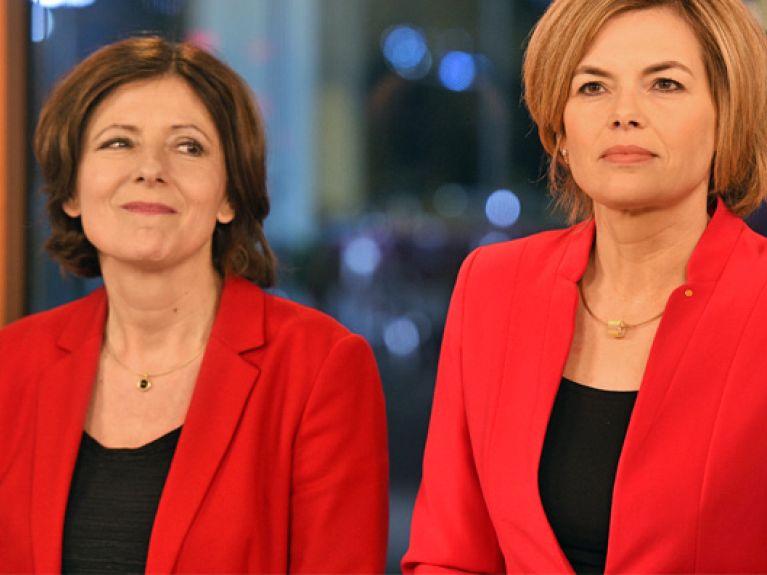Newcomers upset parliaments
The German anti-immigration party, Alternative for Germany, sweeps into three state legislatures.

Berlin (dpa) - The rightwing anti-immigration Alternative for Germany (AfD) party swept into three state parliaments Sunday in elections that were seen as a major test of Chancellor Angela Merkel's handling of the refugee crisis. Only founded in 2013, the AfD secured a dramatic 24.2 per cent of the vote in the economically hard-pressed eastern state of Saxony-Anhalt, and is set to enter the parliaments of the wealthy south-western states of Baden-Wuerttemberg and Rhineland-Palatinate. "We are on the road to victory," AfD national leader Frauke Petry declared to jubilant party members following the elections. Results from the "Super Sunday" elections showed Merkel's conservative Christian Democrats (CDU) only retaining office in Saxony-Anhalt after failing to regain power in both Baden-Wuerttemberg and Rhineland-Palatinate.
The result made the AfD the second-biggest political force in the Saxony-Anhalt parliament, leaving CDU state Premier Reiner Haseloff struggling to form a new coalition in the state. With 15.1 per cent of the vote in Baden-Wuerttemberg, AfD is likely to emerge as the third-biggest force in the state's parliament. The party is now represented in half of Germany's 16 state parliaments. The party scored 12.6 per cent in Rhineland-Palatinate. Despite the surge in support for the AfD, the CDU ruled out any changes to Merkel's refugee policy. "I do not see that," CDU general secretary Peter Tauber said after the polls closed.
Petry joined other AfD leaders in saying that the party was preparing itself to play the role of a strong opposition in each of the state parliaments. "We have for a long time - even before this campaign - aimed at working in opposition," Petry said. "This is a young political force, so it is quite normal that you start in opposition. You can move things along there as well." In Baden-Wuerttemberg, the Greens led by popular state premier Winfried Kretschmann emerged for the first time as the biggest party in a German state parliament with 30.3 per cent of the vote.
AfD's success in the three state polls could provide fresh political momentum ahead of next year's national election, where the party likewise needs 5 per cent of the vote to enter the Bundestag. The vote for AfD underscored the lurch to the right across Europe amid sluggish economic growth, high unemployment and more recently a mass influx of refugees into the region. AfD's poll ratings stood at about 5 per cent nationally in the middle of last year but more recently has jumped to about 10 per cent in the wake of the refugee crisis which emerged in Germany in September.
Before the refugee crisis, the CDU had expected to regain power in both Rhineland-Palatinate and Baden-Wuerttemberg. Instead, results show Kretschmann building on his success in the last election in 2011 to again head up the next government in Baden-Wuerttemberg, which is home several of Germany's biggest corporate names, such Mercedes-Benz, Porsche and Hugo Boss. "Baden-Wuerttemberg has again made history," said Kretschmann, who became Germany's first and only Green government chief in the 2011 election.
In Rhineland-Palatinate the polls showed state Premier Malu Dreyer's SPD-led government emerging victorious to see off a challenge from CDU candidate Julia Kloeckner, who has for the second time lost her bid to oust the SPD. Speaking after the results rolled in, Dreyer insisted that it was too early to speculate about the shape of the new coalition she would build. But the more than 10-percentage-point swing against her current partner, the Greens, points to the premier being forced into a new three-party coalition in the state.
Dreyer's victory is likely to save the SPD from the threat of a leadership crisis after the party suffered big swings against it in the two other states. The sharp fall in the SPD's support in Baden-Wuerttemberg wiped out the parliamentary majority for the Greens-led coalition with the SPD, meaning that Kretschmann will have to seek out new allies to form a government. Likewise, Haseloff will have to forge a new coalition in Saxony-Anhalt after the SPD, which is his current government partner, suffered a 10-percentage-point swing against the party.
